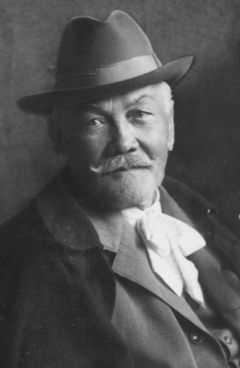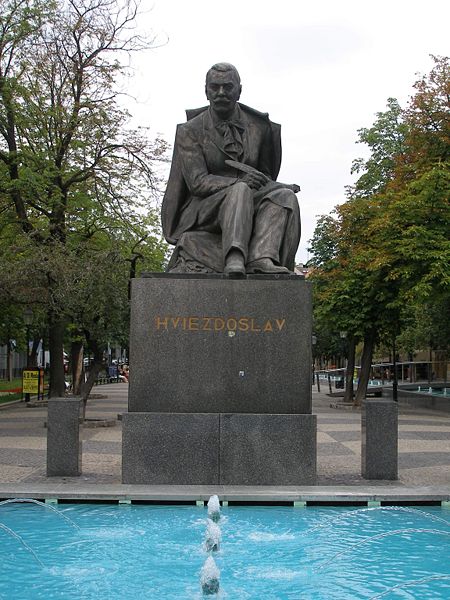<Back to Index>
- Mathematician Kazimierz Kuratowski, 1896
- Poet Pavol Országh Hviezdoslav, 1849
- 4th President of Italy Antonio Segni, 1891
PAGE SPONSOR


Pavol Országh Hviezdoslav (* February 2, 1849 in Vyšný Kubín, Austrian Empire (now Slovakia), † November 8, 1921 in Dolný Kubín, Czechoslovakia (now Slovakia), was a Slovak poet, dramatist, translator and a member of the Czechoslovak parliament for a short time. At first, he used a traditional style of writing, but later he was influenced by parnassism and modernism.
Born as Pavel Országh in Felsőkubin, Hungary, Ország became a Hungarian patriot and wrote his poems only in Hungarian until the 1860s. He had noble origin. He studied in Miskolc, Késmárk, (now Kežmarok, Slovakia) Budapest and Eperjes (now
Prešov, Slovakia). Hviezdoslav (a Slavic name, meaning approximately
"celebrating the stars" and/or "Slav of the stars") was his pseudonym
from 1875. His earlier pseudonym was Jozef Zbranský. His father was a poor squire and had his son work in the field. Hviezdoslav studied in grammar schools in Miskolc and Kežmarok (Késmárk). After his graduation in 1870, he continued his studies in the Law Academy of Prešov (Eperjes) where in 1871 he participated in the preparation of the Almanach Napred ("Forward" Miscellany/Almanac) which marks the beginning of a new literary
generation in Slovak literature. Due to his contribution to this
Almanac with several radical poems, however, he was ignored in the
literature life of the country in the rest of the 1870s and could not
published his works. During this period he pursued his law carrier in
Dolný Kubín but he also carried on with his literature
work in his spare time. He practiced as a lawyer between 1875 and 1899 in Námestovo (Námesztó) and then in Dolný Kubín again. In 1918 he became a member of the newly created Revolutionary National Assembly (provisional governing body, later parliament) in Prague and from 1919 - 1920 served as its representative. In 1919 he was chosen as the leader of the re-established Matica slovenská. In 1954, the Literary Museum of P.O. Hviezdoslav was established in Dolný Kubín. A festival of amateur reciters named Hviezdoslav's Kubín has been held there since.
The Slovak Matica is a cultural institute. During the darkest years of Slovak literary life, Slovak Matica kept alive Slovak literature. The intolerant anti-Slovak policy of the Hungarians forcibly closed the
doors of Matica and confiscated its property in 1875. The Matica was
re-opened after the creation of Czechoslovakia in 1919. Hviezdoslav was
honored by being named its new head. Under his inspired leadership, the
Matica spread and grew. Under the colorful pen name of Hviezdoslav, he was a fertile writer and a prolific translator. He introduced the syllabic tonic verse into Slovak poetry. He was a leading representative of Slovak literary realism.
His works are characterised by extensive use of newly created words and
expressions; they are therefore difficult to translate into foreign
languages. He has enriched Slovak literature with some 12 volumes of original poetry and an additional 3 volumes of translations of classical works. During his era, he was the poet laureate of the Slovak nation. In honor of his quality translation, made in 1905, of The Tragedy of Man by Imre Madách, he was elected a member of the Kisfaludy Society in 1912. In their intimacy and reflection Hviezdoslav's works address universal human concerns. Hviezdoslav was also a versatile translator who endeavored in this occupation to refine and enrich the Slovak language and to advance its potential as a medium of poetic expression. He translated many masterpieces of such authors as Goethe (Faust, Iphigenia on Tauris, ballads), Schiller (selected poems), Mickiewicz (Crimean Sonnets), Pushkin (Boris Godunov, The Captive of the Caucasus, The Gypsies, Rusalka et al.), Shakespeare (Hamlet, A Midsummer Night's Dream), Słowacki (In Switzerland et al.), Arany (28 lyric poems and ballads), Petőfi (42 selected poems), Lermontov (A Song about the Emperor Ivan Vasilievitch, The Song of the Merchant Kalashnikov, The Demon) and Madách (The Tragedy of Man). These artistic translations are collected (after his death) into vol. No.12 to No.15 of The Collected Poetical Works of Hviezdoslav.